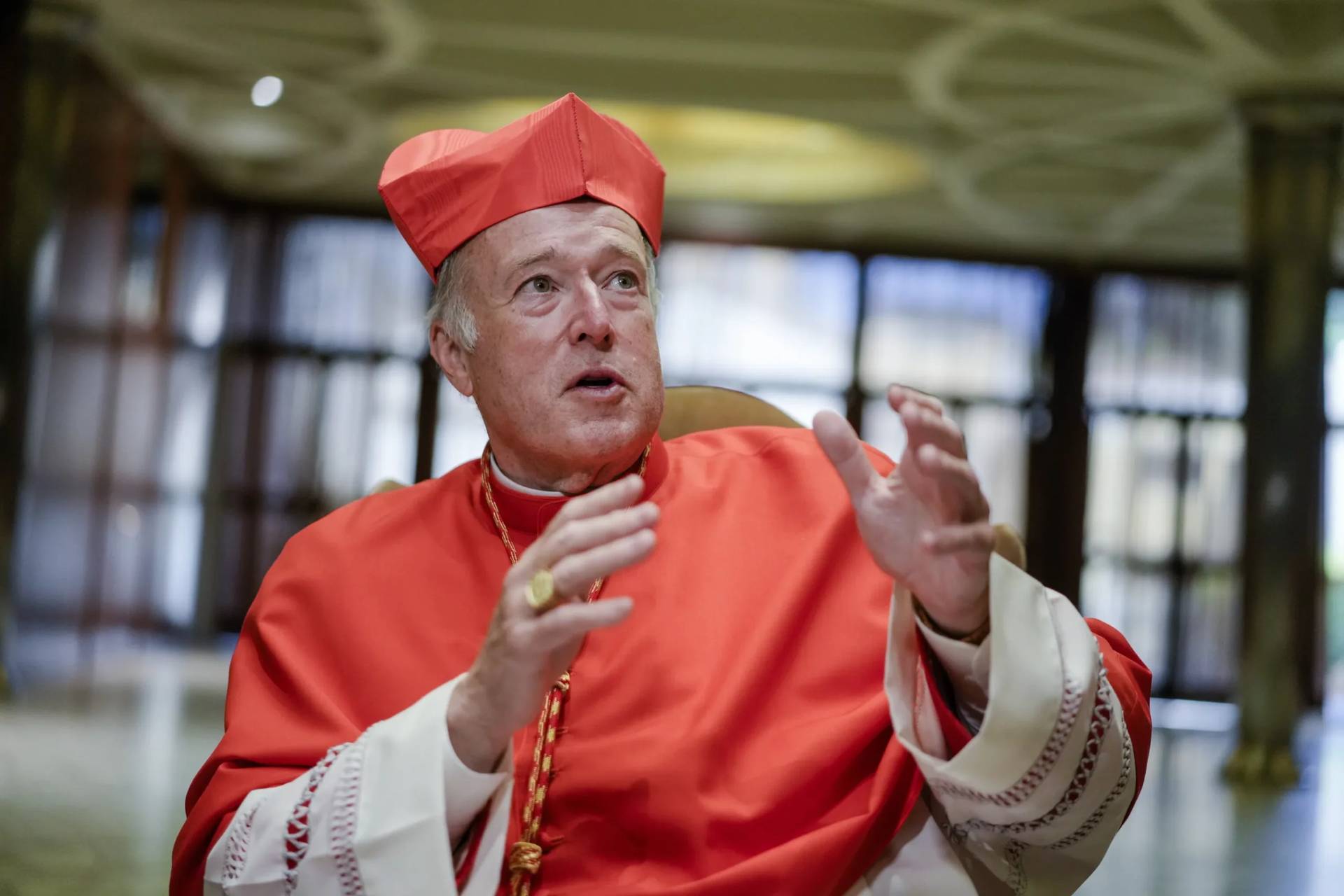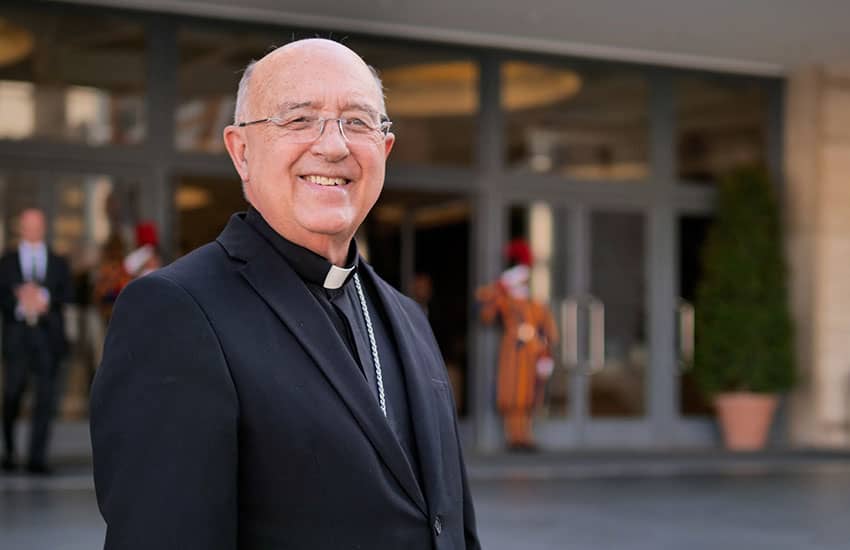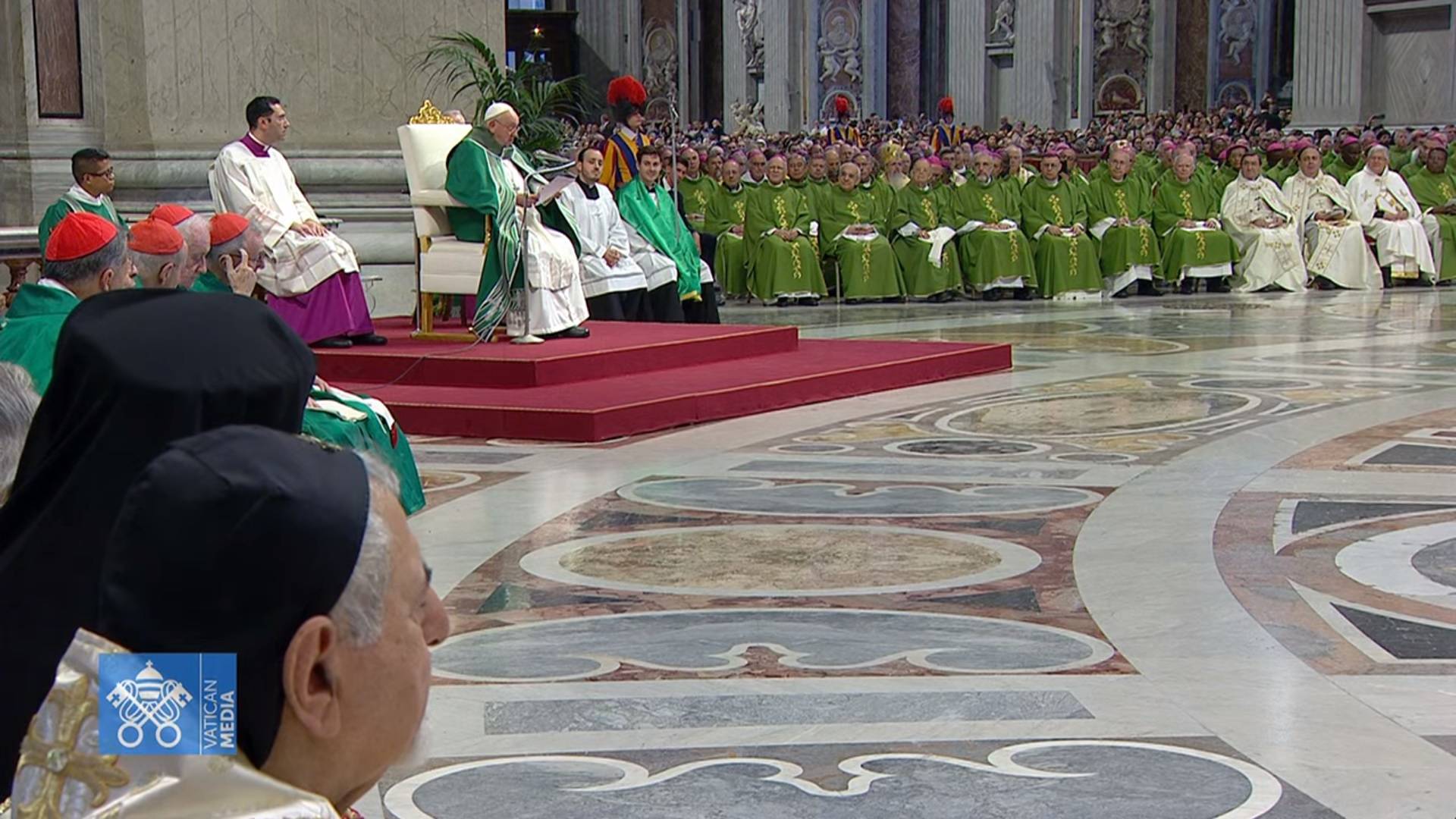ROME – With a seemingly endless rotation of events taking place in and around the Vatican this month, Thursday saw several significant developments for both local initiatives and issues of international relevance.
Participants in the pope’s Synod of Bishops on Synodality, which is nearing the conclusion of its first Rome-based discussion, offered an update on the process and addressed criticisms, while Francis himself presided over a high-profile prayer event on behalf of migrants and refugees.
Jewish leaders also met with the pope at the Vatican against the backdrop of a new war between Israel and Hamas that observers warn is threatening regional security, while a dozen priests from Nicaragua arrived in Rome as tensions between Church and state in the country worsen.
Synod ‘conspiracies’ and a prayer for migrants
During an Oct. 19 press briefing, a panel of synod participants including Canadian Cardinal Michael Czerny, Archbishop Dabula Anthony Mpako of Pretoria, South Africa, and head of the country’s military diocese, and American Bishop Daniel Flores of Brownsville, Texas, who was among the organizers of the synod, updated journalists on the process.
The panel spoke about the issue of migration ahead of a special prayer for migrants and refugees led by Pope Francis in St. Peter’s Square Thursday evening, and addressed suspicions of an alleged “conspiracy” to manipulate the synod process.
Asked about allegations that a liberal cabal is directing the synod in a way that is meant to change Church teaching on hot-button issues such as women’s priestly ordination and homosexuality, Flores said “we live in a very suspicious age.”
“The very air we breathe is that,” and it has effects both inside and outside of the Church, he said, but insisted that “I have no worry about that, I do not see a conspiracy, I have seen honest, sincere, faithful, charitable conversations sub tutela Petri, under the care of Peter. That is not a threat to the faith.”
Similarly, Mpako said the desire for a more synodal Church in which everyone is called to participate “is something that many of us have been calling for,” and that the idea of a conspiracy “doesn’t connect with the reality as I know it…I would not share that concern of a conspiracy.”
Flores also spoke about immigration in the United States and the large influx of migrants coming from South and Central America over the past few years, many of whom pass through his diocese.
Pointing to differences in Latin American and North American culture, Flores said, “Latin America is very large and very complex, and so is the United States and so is Canada,” and said one concrete fruit he hopes comes out of the synod process is “more structured conversations between North America and Latin America.”
“To me, this is a question that needs to be thought about, because we need to open up that conversation. It’s something that the Church universal has been dreaming of and hoping for, for several generations,” he said.
Participants also addressed concerns that a renewal of Church structures in the spirit of synodality would interfere with the hierarchical structure of the Church, insisting that there is nothing to fear in this regard, as well as the discrimination and criminalization that members of the LGBTQ+ community have faced.
To this end, Flores stressed the need to welcome everyone with open arms, without asking about their political, sexual, or religious orientations, offering them first “the embrace of Christ.”
Mpako said there is a need to show “compassion and acceptance” to members of the LGBTQ+ community and not to discriminate or make them “feel like outsiders in the community of the Church.”
However, the Church is approaching the issue in the light of Christian anthropology and “we are still trying to see how that anthropology responds to this question,” he said, voicing his belief that the issue “is not going to be resolved anytime soon.”
Czerny also advocated on behalf of migrants and refugees and decried “the terrible silence” of the world in the face of their plight.
In his prayer for migrants and refugees Thursday night, which took place at the statue dedicated to migrants in St. Peter’s Square and which featured testimonies from some migrants, Pope Francis pointed to the various challenges they face along their routes, including torture, imprisonment, and rape, as well as the “selfishness, indifference, and fear” of those who turn them away.
He called on Christians to imitate the Good Samaritan in welcoming and caring for migrants and advocated for the expansion of “regular migration channels” in order keep migrants safer.
“It is clearly necessary to bring demographic and economic policies into dialogue with migration policies for the sake of all those involved, without ever forgetting to put the most vulnerable at the center,” he said.
Nicaragua
On Thursday, Vatican spokesman Matteo Bruni confirmed to journalists that the Holy See received 12 Nicaraguan priests recently released from prison, saying the Holy See accepted a request to take them from the Nicaraguan government, “and they will be welcomed by an official of the Secretariat of State in the afternoon and housed in some structures of the Diocese of Rome.”
News of the agreement was first announced in a statement from the Nicaraguan government late Wednesday, with President Daniel Ortega saying the priests would be flown to Rome within the week after what he described as productive talks with the Vatican.
The government statement said the agreement showed “the permanent will and commitment to find solutions” amid ongoing tensions between Church and state in Nicaragua, which have already seen the expulsion of the Jesuits earlier this year, as well as the ongoing detainment of Bishop Rolando Álvarez of Matagalpa.
Álvarez, who in February was sentenced to 26 years in prison shortly after Ortega exiled 222 prisoners to the United States, having refused to board the flight, was not among 12 priests sent to Rome.
Ortega’s regime has aggressively opposed the Catholic Church in recent years, insisting that Church leaders backed mass protests against his administration in April 2018, which he has described as an attempted coup.
Pope meets head of the World Jewish Congress
Also on Thursday, World Jewish Congress (WJC) President Ronald Lauder met with Pope Francis at the Vatican in a meeting the Vatican said was planned in September. It came as tensions escalate in the Middle East following a Hamas-coordinated surprise attack on Israel and Israel’s retaliatory siege of Gaza.
During the meeting, Lauder, according to a WJC press release, urged the pope to continue using his moral authority to appeal for the safe return of Israeli hostages taken during the Hamas offensive.
Pope Francis has issued several direct appeals for peace in the Holy Land following the outbreak of what Israeli Prime Minister Benjamin Netanyahu has said is a new “war.” While acknowledging Israel’s right to self-defense, the pope has also called for the protection of civilian life, especially in Gaza.
Francis designated Oct. 17 as a day of prayer and fasting for peace but following a strike on a hospital in Gaza that left at least 500 people dead, many of them children, on Wednesday he announced Oct. 27 as a second day of prayer and fasting with a special holy hour for peace to be held in St. Peter’s Basilica.
In their statement, the WJC said Lauder asked Pope Francis to “use your power, to use your strength, to get these hostages released,” saying, “You may be the only person who has the moral authority to do this.”
Thursday’s meeting also marked the inauguration of the WJC’s representative office to the Holy See, marking the first-ever liaison office of a Jewish organization on Vatican property, a step that has been hailed by observers as significant progress in strengthening Jewish-Catholic relations.
On the office opening, Lauder said, “For decades, the World Jewish Congress has tirelessly pursued a deeper bond between world Jewry and the Catholic Church.”
“Our Vatican office’s inauguration crystallizes the unwavering dedication of both the WJC and the Holy See to mend historical rifts and sculpt a future underscored by unity, particularly as Israel counters devastating assaults,” he said.
On Oct. 19, amid the ongoing carnage in Gaza, the Orthodox Public Affairs Committee (OPAC) lamented the bombing of the 12th century Saint Porphyrius Greek Orthodox Church in Gaza City, which had been sheltering civilians seeking refuge from Israel’s bombing campaign.
In a statement, the OPAC called for the protection of civilians as well as “the sanctity of sacred spaces” and religious sites, which they said are “symbols of peace, unity, and spirituality.”
“The bombing of a place of worship, of any faith, is an affront to the values we hold dear and signifies a grave violation of human rights,” they said, urging peace.
Follow Elise Ann Allen on X: @eliseannallen















